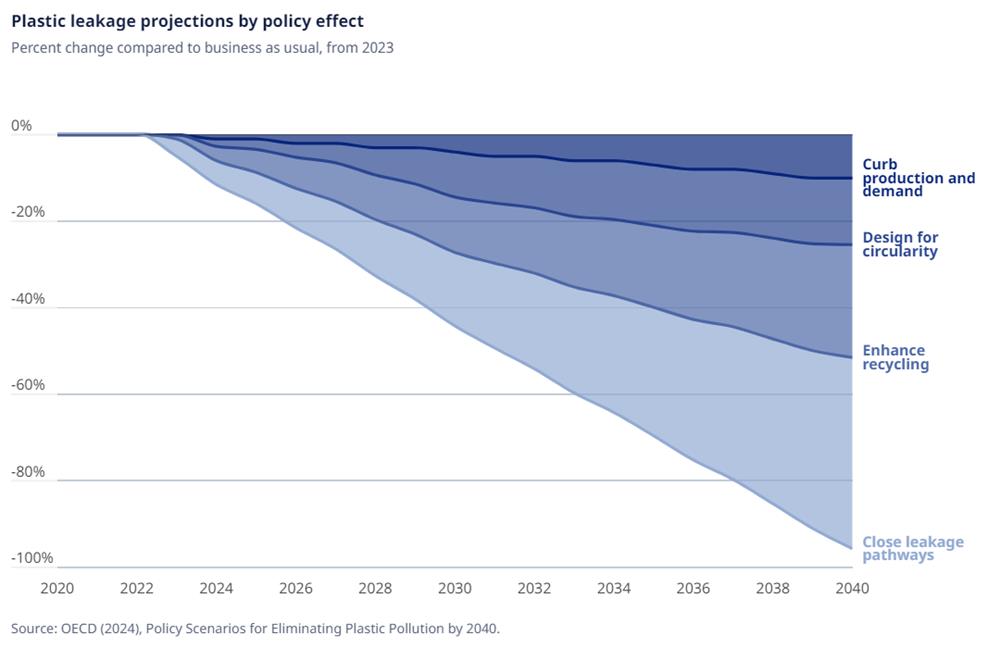|
|
|
|
| News Details |
| |
| Global action across the plastics lifecycle could nearly eliminate plastic pollution by 2040 |
3/10/2024 |
|
|
|

Comprehensive global policies addressing the entire plastics lifecycle can reduce plastic leakage into the environment by 96% by 2040, according to a new OECD report. By implementing a mix of policies – from enhancing plastic waste management and recycling, to curbing plastic use and waste – countries can achieve significant environmental benefits and economic savings compared to less balanced strategies.
Without stronger policies, plastics production and use are projected to increase by 70%, from 435 million tonnes (Mt) in 2020 to 736 Mt in 2040, with only 6% of plastics coming from recycled sources. In parallel, mismanaged plastic waste, i.e., plastics that at end of life are dumped, inadequately disposed of or littered, will increase by 50% (from 81 Mt annually in 2020 to 119 Mt annually in 2040). Leakage of mismanaged plastics into the environment, including their release into rivers, oceans, and land, will increase by 40%.
Ahead of a critical round of UN talks in November to agree a legally binding treaty on plastic pollution, the OECD report Policy Scenarios for Eliminating Plastic Pollution by 2040evaluates the environmental and economic implications of strategies to reduce and ultimately end plastic pollution.
“Our analysis shows that ambitious policies across the entire plastics lifecycle, if implemented globally, could nearly eliminate plastic pollution by 2040,” OECD Environment Director Jo Tyndall said. “This approach not only improves waste collection, treatment and recycling, but also reduces plastic production and demand, and promotes circular design.”
Interactive Flourish chart: 2410 Plastics EN leakage (uri.sh)
Partial solutions to plastics pollution will not solve the problem. Focusing solely on waste management without curbing production and demand would reduce plastic leakage to the environment by only 55% compared to business as usual by 2040. If plastic waste is better managed but without dedicated policies to reduce waste volumes, the costs of doing so will significantly increase, making it progressively more difficult for countries to eliminate plastic leakage. Similarly, policy packages with partial geographical coverage or with limited stringency would also fail to reduce plastics use, waste and leakage below 2020 levels.
OECD projections indicate that policies targeting all stages of the lifecycle, while resulting in a small drop (0.5%) in global GDP, are more cost-efficient compared to strategies focused solely on waste management. The latter would lead to an even larger 0.8% GDP loss by 2040. Developing countries and those with less advanced waste management systems, particularly those in Sub-Saharan Africa, are projected to face the greatest macroeconomic costs.
Under a business-as-usual scenario, global investment needs for plastic waste management are expected to reach USD 2.1 trillion between 2020 and 2040. Policies that address the entire plastics lifecycle would limit additional investments in waste management infrastructure – on top of business as usual – to USD 50 billion between 2020 and 2040. Cost increases are limited, due to the redirection of investment flows towards improved sorting and recycling and away from less advanced options. Conversely, should countries seek to eliminate plastic leakage by focusing on waste management alone, costs will be higher. Under such a scenario, an additional USD 300 billion would be required between 2020 and 2040 on top of business-as-usual investments.
To support a whole-of-lifecycle approach, the OECD report calls for policies such as plastic and packaging taxes, eco-design criteria and product standards, bans on selected single-use plastics and Extended Producer Responsibility schemes for packaging and durables that could encourage a more sustainable plastics economy.
The report also recognises that additional interventions will be needed to comprehensively tackle other aspects of plastic pollution, such as to mitigate risks related to microplastic pollution, chemicals of concern, plastics-related greenhouse gas emissions and legacy pollution.
Read the policy highlights and the digital report to discover more.
|
|
|
|
|
|
|
|
|
|
|
|
| |
|
|
|
|
|
|
| |
|
|
| |
|
Post your Comment |
|
|
|
|
|
|
|
|